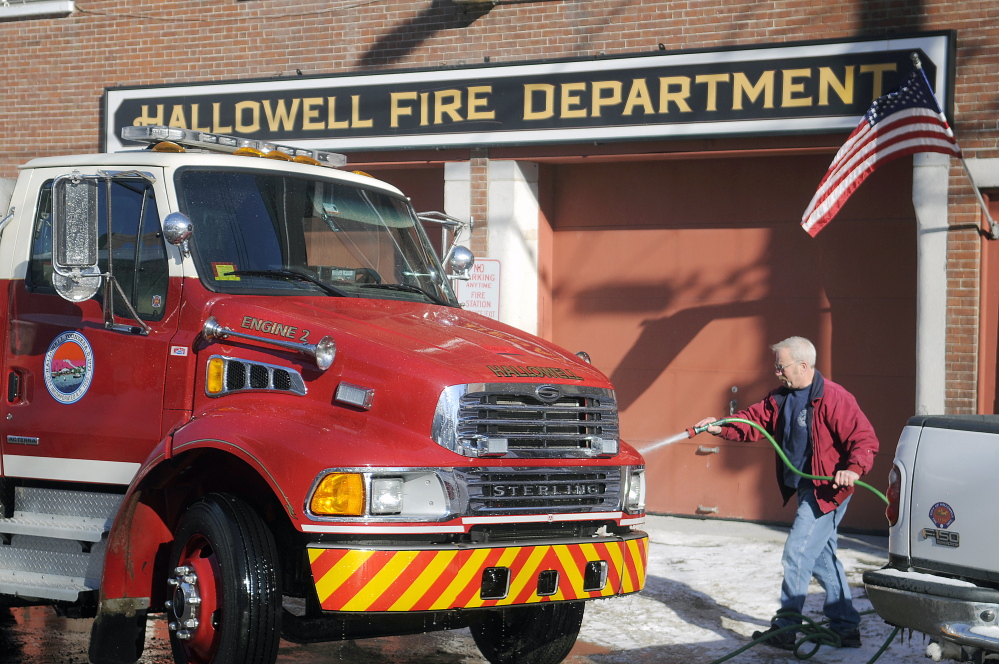HALLOWELL — After months of discussion, debate and public meetings, the Hallowell Fire Services Committee appeared ready Thursday to make a recommendation to the City Council for the city’s fire protection services future. But after more than two hours, and with a split among committee members, the vote was deferred for another day.
Chairman Bob Duplessie, Dawn Gallagher and Sandy Stubbs were in favor of contracting with Augusta; Councilor Diano Circo and Dan Davis thought combining with Farmingdale made the most sense.
The meeting ended somewhat confusingly because there was an apparent vote to make a recommendation, but then Circo made a motion to give the council a majority and a minority report. Those reports will not be ready for Monday’s council meeting, and at this point, it’s uncertain when that recommendation will be made.
More than 30 people attended the meeting, which was held in the City Hall auditorium because a large crowd was anticipated. Hallowell’s longtime fire chief, Mike Grant, was absent because of a previous work commitment.
During the public comment period, Hallowell resident Peter Gray made an impassioned plea not to “give away a city’s core services,” which got a round of applause from a majority of people in the auditorium. When asked, a Hallowell Fire Department spokesman said the department would prefer to build a station in Hallowell but said a shared station in Farmingdale would be acceptable.
One Hallowell resident expressed concern that Augusta would be able to renegotiate its contract after 10 years, thus putting Hallowell at a leverage disadvantage. But Augusta Fire Chief Roger Audette said there would be good-faith negotiations with minimal cost-of-living increases, much like the emergency medical services agreement the two cities have.
Audette also said too much focus was being placed on who has or doesn’t have a ladder truck. Instead, the driving question should be about what plan gets the most firefighters to Hallowell in the shortest amount of time.
Hallowell Police Chief Eric Nason spoke about the number of times throughout the year when the Police Department relies on firefighters for help with directing traffic after an accident or a parade.
On the other side of the argument, former Hallowell Mayor Bob Stubbs spoke in favor of contracting with Augusta because “Augusta has promised 12 full-time firefighters at all times, and currently in Hallowell, we have zero.”
Since Mayor Mark Walker appointed the committee in January, committee members have debated the merits of more than nine scenarios and ultimately narrowed their choices before making their recommendation.
“This decision for fire services in our city has been punted for probably 20 years,” Walker said at the beginning of the meeting. “Their core mission was to make a fact-based decision.”
At a meeting last week, officials from Hallowell, Augusta and Farmingdale made their pitch to the committee about why their proposal made the most sense for the city.
Grant, who has indicated that he won’t be seeking re-appointment in January, has long been a proponent of Hallowell investing in keeping its own department.
Grant and Stevens Commons owner and developer Matt Morrill proposed building a fire station adjacent to the campus’s Erskine Building. The new station would be part of a multi-phase plan that also would include renovating part of the Erskine Building to house a new Hallowell public safety department.
That plan would cost about $2.3 million over 10 years, which includes an estimated $800,000 for the construction of the fire station. It would add $80.42 in property tax yearly based on $182,000 of valuation.
According to city officials, Hallowell would raise $1.1 million through a bond issue for that plan, and including interest, the city would pay back almost $1.5 million over 20 years for the bond.
Farmingdale, which is planning to build a state-of-the-art fire station in the next few years, proposed leasing a space in the town’s station with room for two firetrucks. Hallowell and Farmingdale would share the station but operate as autonomous departments.
Under that arrangement, Hallowell could keep its own department, which Grant said includes well-trained and dedicated firefighters. Grant said the two departments often train together and have a good working relationship. One of the downsides to that plan, however, is that leasing or having part-ownership of a building is less tangible than complete ownership of a fire station; plus, the Farmingdale station is outside of Hallowell’s city limits.
A fourth plan, re-introduced at the meeting, called for new Hallowell fire station, two per diem firefighters on call around the clock, and a fire chief working 20 hours per week. The plan would cost nearly $4.24 million over 10 years and would add $258.99 in yearly property tax per $182,000 of valuation. The city would raise more than $3.1 million from its general fund and an additional $1.1 million in a bond issue.
The Augusta plan, in which Hallowell would disband its current department and contract with the state capital’s Fire Department, is expected to cost roughly an average of $180,000 per year over 10 years, all for personnel costs. The agreement would add $100.91 in annual property tax based on $182,000 of valuation.
It is the second-most expensive scenario to individual property owners. But according to the plan, Hallowell would receive the same fire protection services Augusta provides to its own residents, and there would be little to no overhead cost or responsibility to Hallowell.
Jason Pafundi — 621-5663
Twitter: @jasonpafundiKJ
Send questions/comments to the editors.




Comments are no longer available on this story